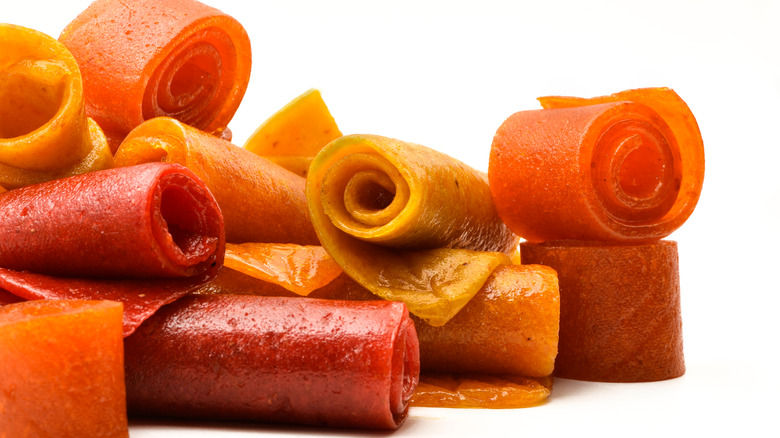Why Making Your Own Fruit Leather Isn't Worth It
It can be tough to find healthy snacks that are still tasty and craveable, but fruit leather manages to do both. Conceptually similar but much healthier than Fruit Roll-Ups, fruit leathers are chewy strips of dried fruit, per Washington State University. The best part is that you can find them in just about any fruity flavor you can think of — single-fruit leathers like strawberry, apricot, or peach or fun combinations like blueberry-banana, pumpkin-apple, or peach-raspberry (via MorningChores).
Just like how juices or smoothies have high concentrations of fruit, most fruit leathers pack a ton of fruits into a single strip, so you're getting more bang for your buck and plenty of nutrients in each bite. According to the International Journal of Food Science, pulp-based fruit leathers are high in dietary fibers, vitamins, minerals, and antioxidants, making them a healthy snack to nosh on.
As with any store-bought food, however, it's always important to watch for added ingredients like sugar. Yet while you may be tempted to make it at home, there's a good reason for why homemade fruit leather may not be worth the trouble.
A long process with disheartening results
Homemade smoothies are an easy way to whip up a healthy snack — just throw all the ingredients in a blender and you're good to go. Fruit leather, however, is not so simple to make at home. Multiple kitchen appliances are needed, including processors to make the purées, food dehydrators, and fine-mesh sieves (via Food Network). Once fresh fruit has been washed and seeds, stems, and peels have been removed, Washington State University explains that the fruit should be puréed and placed in a dehydrator on top of drying sheets.
Then the mixture needs to dehydrate for six to eight hours, per Fresh Off the Grid; although Food Network notes the entire process can take over 20 hours to complete. In addition, the end result typically has an unappetizing color and texture in comparison to the store-bought versions most people are used to, which may make you less likely to wolf it down.
So when it comes to fruit leather, store-bought is usually better, but be sure to pay attention to added sugar or other unwanted ingredients.

